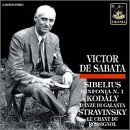| All Artists: Zoltan Kodaly, Jean Sibelius, Igor Stravinsky, Victor De Sabata, C. Courtly Music Consort, New York Philharmonic Title: Sibelius: Symphony No. 1; Kodaly: Dances of Galánta Members Wishing: 0 Total Copies: 0 Label: Urania Release Date: 9/19/2000 Album Type: Import Genres: Dance & Electronic, Classical Styles: Opera & Classical Vocal, Ballets & Dances, Dances, Forms & Genres, Theatrical, Incidental & Program Music, Historical Periods, Modern, 20th, & 21st Century, Symphonies Number of Discs: 1 SwapaCD Credits: 1 UPCs: 675754274627, 8025726221555 |
Search - Zoltan Kodaly, Jean Sibelius, Igor Stravinsky :: Sibelius: Symphony No. 1; Kodaly: Dances of Galánta
 | Zoltan Kodaly, Jean Sibelius, Igor Stravinsky Sibelius: Symphony No. 1; Kodaly: Dances of Galánta Genres: Dance & Electronic, Classical
|
Larger Image |
CD Details |
CD ReviewsIdiosyncratic Sibelius Hiram Gomez Pardo | Valencia, Venezuela | 05/28/2004 (5 out of 5 stars) "De Sabata gave a splendid even monumental reading of this inspired work from Jean Sibelius. De Sabata with the genius touch he always had gave an epic approacn to the Symphony, and produced an incandescent performance. The New York Philarmonic in his best. A directorial triumph. Don't miss this issue. A historical document." Very Disappointing CD Larry A. Brownstein | Austin, Texas USA | 02/09/2006 (1 out of 5 stars) "Buyers of this CD should be aware the recordings were made in 1950 or earlier and that the sound quality is far inferior to anything considered acceptable by modern recording standards. I would suggest this CD only to persons interested in this particular conductor or orchestra; not recommended to someone who wants to enjoy the music of this very interesting symphony." Dated Sound Is the Only Thing Less than Superb About These P Doug - Haydn Fan | California | 07/07/2008 (5 out of 5 stars) "Listening to a Victor de Sabata live concert performance can only be compared to the exquisite joy of driving in a Lancia Flaminia: sadly, far too few people will ever enjoy this rarified privilege.
Here then is a chance to experience true legendary conducting, from a conductor few people today know anything about. Yes, the sound of the live concerts is average mono late forties air checks at best, while the studio recorded Kodaly was made a decade prior just before the start of the Second World War. Yet despite these sonic limitations what music-making is here to be heard! Even the Stravinsky, which without stereo would certainly seem a pointless exercise stripped of its enchanting kaleidoscopic palettes. Despite this seemingly impossible handicap de Sabata kept me listening, and brings the work to a rolling boil. The entire performance glows with excitements rarely caught in even the most up to date stereo versions. These then are priceless and wonderful, and Urania deserves credit for doing a good job with such old mixed sources. If you find all this rather difficult to accept and doubt this Italian conductor could do the Sibelius justice - let alone top the likes of Beecham and the Scandanavians, you'll be rewarded for sticking your neck out, as I did, and giving this CD a try. Believe me - I wasn't sure what to expect. Sometimes, Virginia, there is a Santa Claus. The Galanta Dances have been superbly served by mnay others, including among the earlier versions Fricsay Kodály: Háry-János Suite / Fricsay, Haefliger, et al and Rodzinski Galanta & Marosszek Dances / Caucasian Sketches despite this competition de Sabata not only equals them, he might even surpass them! Certainly he has the better orchestra, a glorious and vintage ensemble that was the pre-war Berlin Philharmonic from 1939, and de Sabata makes the most of his talented group. The Stravinsky, which as I said didn't seem worth the trouble, is remarkably good, and we can only marvel to think a Swedish orchestra from 1947 could remotely approach this level of performance in a modern score. Still, de Sabata's issued recording of Debussy's Jeux remains a phonograph legend, so perhaps the Song of the Nightingale, strikingly like Debussy's Ballet music in its ever shifting layers of orchestra lines and jagged intersecting dance rhythms, was made to order for de Sabata. Notes in Italian, English and French, with pages detailing the recordings - somewhat. The booklet also has a list in very small type of other Urania CDs available. Not for everyone - but then neither are Lancia Faminias." |

 Track Listings (6) - Disc #1
Track Listings (6) - Disc #1